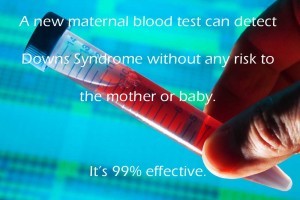According to a recent report produced by the Royal College of Obstetricians and Gynaecologists (RCOG), maternal blood testing for Down`s Syndrome could and should become standard practice.
Until recently, any form of prenatal genetic diagnosis required invasive procedures to obtain samples of fetal tissue for testing. While this form of testing is widely used and extremely accurate it does carry some risks to the fetus and the mother, which include a 1 in 100 chance of pregnancy loss.
Finding intact fetal cells and cffDNA in maternal blood cells has enabled researchers to perform a non-invasive test for Down`s Syndrome, Edwards Syndrome, and Patau Syndrome. This is currently being referred to as Non-Invasive Prenatal Testing.
Non-Invasive Prenatal Testing
Recent medical advancements allow technicians to refine the new “non-invasive prenatal testing” or (NIPT) procedure. It carries no risk to parent or child, produces a 99% success rate in the detection of certain fetal conditions, and can detect the presence of Down`s Syndrome as early as the 10th week of pregnancy.
The process works by taking millions of cffDNA from the maternal plasma, amplifying it and then sequencing it to determine whether there is an over-representation / unusually large presence of chromosome 21, which is the cause of Down`s Syndrome. This procedure works the same way for other fetal conditions by focussing on other chromosomal abnormalities than a high presence of chromosome 21.
This new test has been hailed as the most exciting development in pregnancy care for many years and is currently being trialled by the UK National Screening Committee at Great Ormond Street Hospital, but is already available at private hospitals.
Advantages of NIPT
The major advantage of NIPT is that it’s non-invasive and has very few risks for both the mother and child. Early detection means that parents are able to weigh up their choices without the pressure of additional timeframes, and as these methods are more widely used the cost should drop over time.

